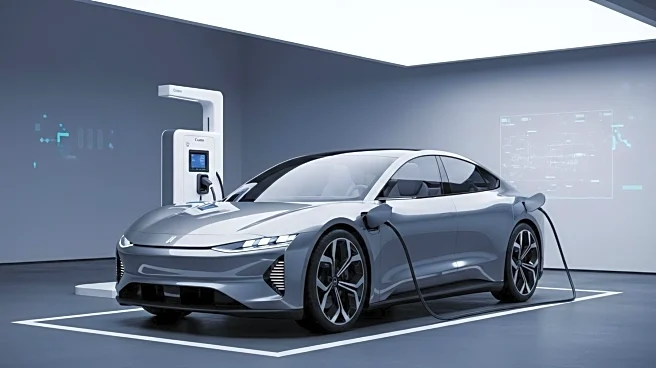What is the story about?
What's Happening?
The UK government has reintroduced an electric car grant, leading to a significant increase in electric vehicle sales in September. According to preliminary figures from the Society of Motor Manufacturers and Traders (SMMT), battery electric vehicle sales rose by nearly a third compared to the previous year, reaching 72,800 units. The grant, which was reinstated in July, aims to help carmakers meet targets under the zero emission vehicle (ZEV) mandate. The grant offers up to £3,750 for eligible electric cars, although it applies to only about a quarter of battery cars on sale due to emissions rules and price limits. The transport secretary, Heidi Alexander, stated that the discounts have made electric cars more affordable for households. Overall, electric and hybrid cars accounted for more than half of the market in September, contributing to a 14% increase in total car sales compared to the previous year.
Why It's Important?
The reintroduction of the electric car grant is a strategic move by the UK government to accelerate the transition to cleaner transportation and meet environmental targets. This initiative is crucial for carmakers who face intense competition, particularly from Chinese manufacturers, and are under pressure to increase electric vehicle sales. The grant not only supports the automotive industry but also aligns with broader climate goals by encouraging the adoption of low-emission vehicles. However, the scheme's limitations, such as the exclusion of certain brands and price caps, may restrict its impact. The increase in electric vehicle sales signifies progress towards reducing carbon emissions, although the overall market share remains below the ZEV mandate target.
What's Next?
The electric car grant is expected to continue driving sales, but its impact may be limited by the scheme's constraints and the potential early closure due to high demand. The government may need to reassess the grant's structure to ensure it effectively supports the transition to electric vehicles. Additionally, carmakers will likely continue lobbying for more favorable conditions to meet ZEV targets. The industry must balance the push for electrification with profitability, as hybrid sales have surged due to their higher margins. Policymakers and industry leaders will need to monitor the grant's effectiveness and consider adjustments to maintain momentum in electric vehicle adoption.
Beyond the Headlines
The electric car grant highlights the complex interplay between government policy, industry dynamics, and environmental goals. While the grant supports the shift to cleaner transportation, it also raises questions about equity and accessibility, as not all consumers can benefit from the discounts. The exclusion of certain brands and price limits may inadvertently favor established manufacturers over newer entrants, potentially stifling innovation. Furthermore, the grant's impact on carbon emissions is uncertain, given the flexibilities in the ZEV mandate that allow carmakers to offset emissions from petrol and diesel vehicles. This development underscores the need for comprehensive strategies that address both market and environmental challenges.















